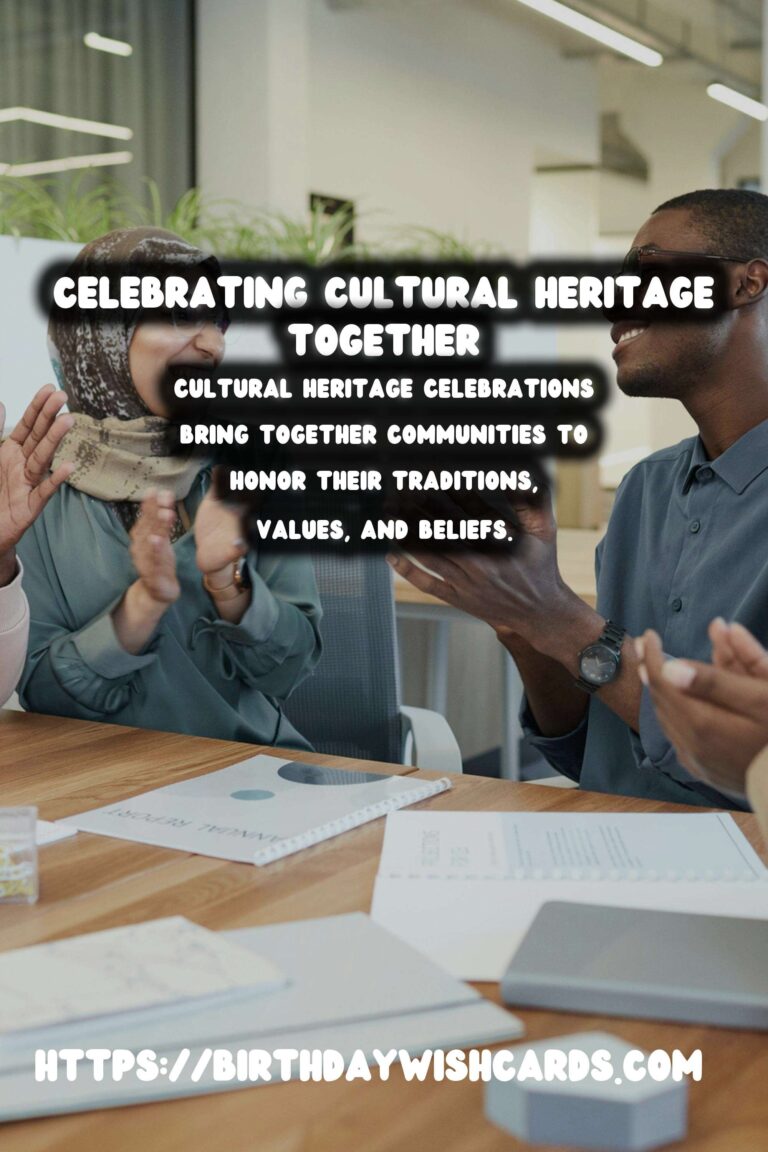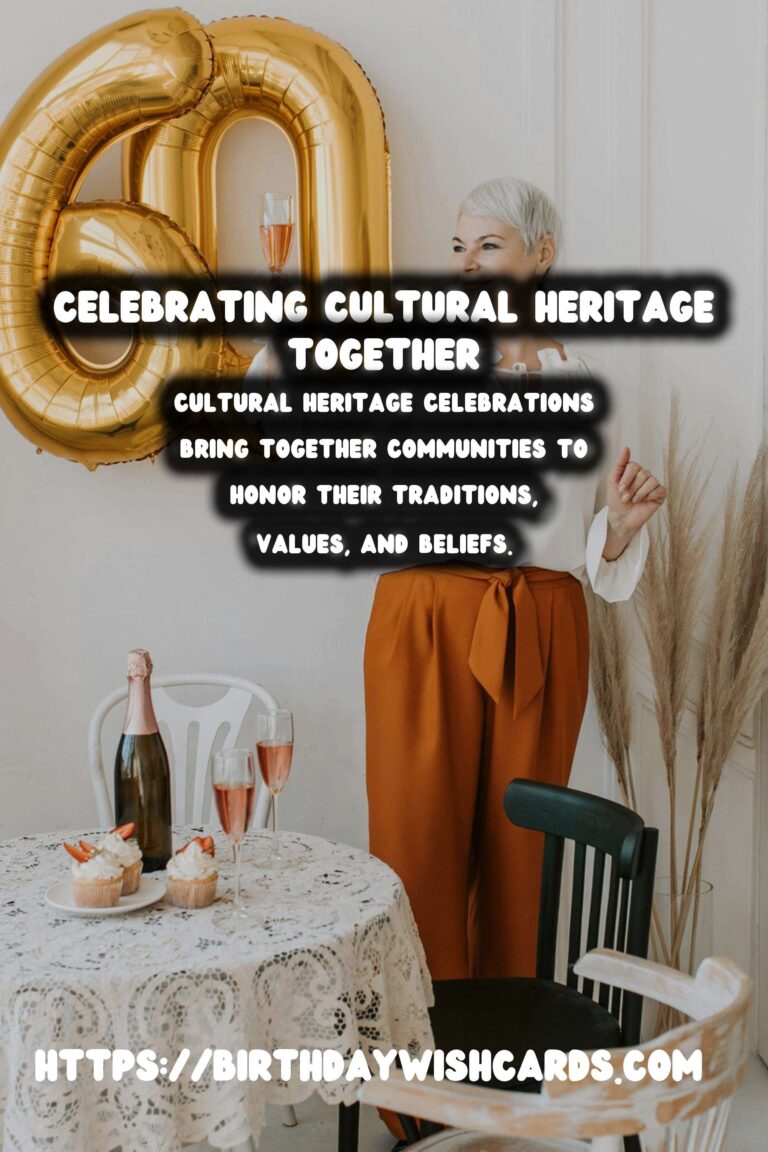
Cultural heritage celebrations bring together communities to honor their traditions, values, and beliefs. Whether it’s a religious holiday, a cultural festival, or a community gathering, these events require thoughtful planning and execution. In this article, we will explore 20 meaningful tips and ideas to enhance your cultural heritage celebrations.
1. Embrace Multiculturalism
In today’s global society, embracing multiculturalism can enhance your event. Consider inviting diverse cultural representatives to share their heritage, food, and traditions. This not only enriches the experience but also fosters understanding and respect among different communities.
2. Choose Authentic Decorations
Decorations play a vital role in setting the atmosphere for your celebration. Opt for authentic decorations that reflect the cultural significance of the event. Handmade crafts, traditional motifs, and local artisan products can provide a genuine touch.
3. Incorporate Storytelling
Storytelling is a powerful way to convey cultural heritage. Organize sessions where participants can share stories related to the culture or religion being celebrated. This can include myths, legends, or personal anecdotes that highlight heritage values.
4. Offer Traditional Cuisine
Food is an integral part of any cultural celebration. Create a menu that features traditional dishes relevant to the culture being celebrated. Involving community members in the cooking process can also stimulate engagement and inclusion.
5. Host Cultural Workshops
Organize workshops that teach skills or crafts inherent to the culture. Examples include dance classes, traditional music sessions, or arts and crafts workshops. These activities not only entertain but also educate attendees about cultural practices.
6. Create a Sacred Space
For religious events, it’s important to create a sacred space that honors the spirituality of the occasion. This can include setting up altars, prayer areas, or meditation zones, allowing participants to experience a deeper connection with their faith.
7. Implement Eco-Friendly Practices
Consider the environment by adopting eco-friendly practices during the event. Use biodegradable materials, promote recycling, and minimize waste. This demonstrates respect for the planet, an essential element of many cultures.
8. Engage Local Artists
Support local artists by inviting them to perform during the celebration. This can include musicians, dancers, poets, or visual artists. Their involvement not only enhances the event but also strengthens the community’s artistic network.
9. Facilitate Dialogue
Encourage dialogue among attendees about cultural diversity, acceptance, and understanding. This can be done through panel discussions, Q&A sessions, or open forums where community members can share their thoughts and experiences.
10. Use Social Media Wisely
Utilize social media platforms to promote your cultural heritage event. Share behind-the-scenes content, highlight participants, and encourage attendees to share their experiences online. This helps raise awareness and attracts a larger audience.
11. Create Themed Attire
Encourage participants to wear traditional attire related to the culture being celebrated. This not only enhances the visual experience but also allows individuals to connect more deeply with the celebration.
12. Capture the Moments
Hiring a professional photographer or setting up a photo booth can allow attendees to capture memories of the event. Consider creating a digital gallery or timeline to share with the community after the event.
13. Plan Children’s Activities
Involve children in the celebration by organizing age-appropriate activities. This can include crafts, games, or storytelling. Engaging kids fosters an early appreciation for their cultural heritage.
14. Highlight Cultural Symbols
Integrate cultural symbols and significance into every aspect of your event. This could be through educational displays, presentation boards, or guided tours. This ensures that attendees leave with a greater understanding of the cultural importance.
15. Encourage Volunteerism
Inviting volunteers to assist with organizing the event can foster community spirit. Volunteers can help with setup, decoration, and managing activities, making them feel part of the celebration.
16. Evaluate Community Needs
Before planning the event, assess what the community wants or needs. Conduct surveys or open dialogues to determine what aspects of the celebration matter the most to the attendees.
17. Promote Inclusivity
Ensure that your event is accessible to everyone, including those with disabilities. This demonstrates an understanding of inclusivity and care for the entire community.
18. Create Partnership Opportunities
Collaborate with local businesses, cultural organizations, or educational institutions. Partnerships can provide additional resources, funds, and co-host events that promote cultural engagement year-round.
19. Share Event Outcomes
After the event, share the outcomes and feedback with the community. This can include participant testimonials, photographs, and highlights. Reflecting on the celebration fosters ongoing community dialogue and can motivate future events.
20. Start Planning Early
Finally, begin planning your cultural heritage celebration well in advance. This allows ample time for coordination, resource acquisition, and community involvement, ensuring the event is successful and meaningful.
By following these tips and ideas, you can create a cultural heritage celebration that not only honors the past but also brings communities together for a brighter future. Embrace the diversity around you, and make each event a meaningful occasion.
Cultural heritage celebrations bring together communities to honor their traditions, values, and beliefs. Food is an integral part of any cultural celebration.
#CulturalHeritage #HeritageCelebration #CommunityEvents

